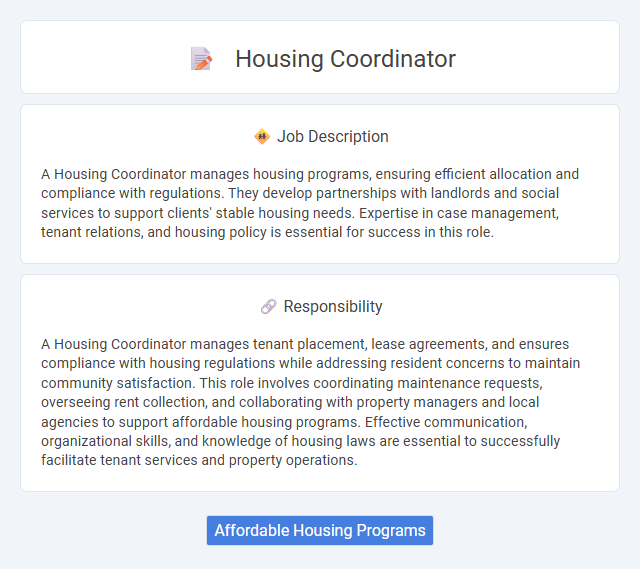
A Housing Coordinator manages housing programs, ensuring efficient allocation and compliance with regulations. They develop partnerships with landlords and social services to support clients' stable housing needs. Expertise in case management, tenant relations, and housing policy is essential for success in this role.
People with strong organizational skills and a compassionate nature are likely to be suitable for a Housing Coordinator position, as the role often requires managing housing arrangements and assisting individuals facing challenging living conditions. Those who can remain patient and adapt to diverse and sometimes stressful situations may find themselves more effective and fulfilled in this job. Conversely, individuals who struggle with multitasking or emotional resilience might face difficulties meeting the demands of this role.
Qualification
A Housing Coordinator must possess strong organizational and communication skills, with a background in social work, urban planning, or public administration often preferred. Experience in property management, knowledge of housing regulations, and proficiency with housing assistance programs like Section 8 enhance the candidate's qualifications. Certification in housing management or case coordination further strengthens the ability to manage tenant relations and housing resources effectively.
Responsibility
A Housing Coordinator manages tenant placement, lease agreements, and ensures compliance with housing regulations while addressing resident concerns to maintain community satisfaction. This role involves coordinating maintenance requests, overseeing rent collection, and collaborating with property managers and local agencies to support affordable housing programs. Effective communication, organizational skills, and knowledge of housing laws are essential to successfully facilitate tenant services and property operations.
Benefit
A Housing Coordinator position likely offers benefits that support both personal and professional well-being, such as health insurance, paid time off, and retirement plans. Employees might also gain opportunities for career development through training and networking within the housing sector. Access to resourceful community partnerships could further enhance job satisfaction and effectiveness.
Challenge
The role of a housing coordinator likely involves navigating complex challenges related to securing affordable and suitable housing for diverse populations. They may face obstacles such as limited housing availability, strict regulatory environments, and coordinating between multiple stakeholders with conflicting interests. Successfully managing these challenges probably requires strong problem-solving skills, adaptability, and effective communication strategies.
Career Advancement
Housing coordinator roles provide foundational experience in property management, tenant relations, and compliance, serving as a vital stepping stone for career advancement in real estate and social services sectors. Professionals can progress to positions such as housing manager, real estate consultant, or community development specialist by acquiring skills in project management, budgeting, and policy implementation. Pursuing certifications like Certified Property Manager (CPM) or Housing Credit Certified Professional (HCCP) enhances expertise and opens doors to higher-level supervisory and strategic roles.
Key Terms
Affordable Housing Programs
Housing coordinators manage Affordable Housing Programs by assisting clients in navigating eligibility requirements, application processes, and resource allocation to secure low-cost housing options. They collaborate with local government agencies, non-profits, and property managers to ensure compliance with housing regulations and optimize program effectiveness. Their expertise supports community development initiatives by increasing access to safe, affordable housing for vulnerable populations.
 kuljobs.com
kuljobs.com